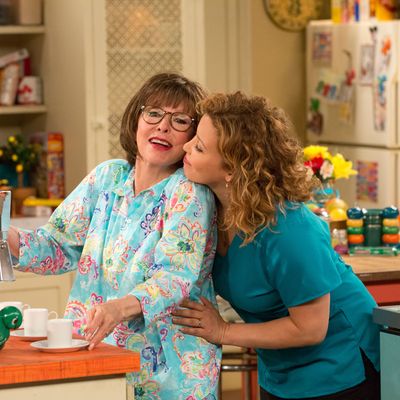
Even though it airs on a streaming service, Netflix’s reimagining of Norman Lear’s One Day at a Time is close to a perfect example of old-school, all-things-to-all-people broadcasting: smart but not hifalutin, blunt but not crass, politically and culturally aware (often self-aware) but never academic or theoretical, and proudly old-fashioned in its methods. The 1975 Lear original was about a divorced, working-class white woman (Bonnie Franklin) raising her strong-willed children while navigating the emotional minefield of single life. The new incarnation, executive produced by the 94-year old Lear but overseen mainly by Gloria Calderón Kellett (iZombie) and Mike Royce (Men of a Certain Age), keeps the core concept but changes the details. The family here is very specifically Cuban-American; the mother (Justina Machado’s Penelope) is an Army veteran who served in Afghanistan and now works as a nurse, and her reasons for leaving her husband are much darker than they were in the original. The landlord, Schneider, is a reedy, urban hipster type (played by Todd Grinnell) who just got his five-year sobriety chip and wants to seem down with everyone in the family. The dialogue broaches topics that are specific to our current era: The pilot revolves around the sexual politics of a quinceañera, while a follow-up sees Penelope bonding with another female vet over their feelings of alienation, and arguing with her super-left-wing teenage daughter, Elena (Isabella Gomez), about whether they should buy a new (used) car or start taking public transportation to reduce the family’s carbon footprint.
And yet, the series still feels like comfort food. That’s because the newness of Penelope and her world is nestled within the tradition of the stage-bound, multi-camera, shot-before-a-live-audience comedy, as well as within the more specific Norman Lear tradition of creating major characters that represent distinct political viewpoints without denying their humanity, then pitting them against each other in verbal combat without giving up on the idealistic notion that there’s common ground to be found somewhere if you look hard enough. The dialogue is 1970s community-theater broad, thick with declarations and denunciations, muttered asides and kiss-offs. And the various “sides” taken by the major players aren’t as monolithic as they initially seem. There’s a lot of chest puffing in the squabbles, and none of the characters are as entrenched in their viewpoints as they want others to believe. Given the choice between maintaining absolutist positions and amending them or folding outright in the name of family solidarity, they always go with the second option. Their practicality is rooted in the hard realities of class: This is a family that struggles to find stable ground in the new economy and often seems to be one or two paychecks ahead of ruin. “I know we’re not rich,” says Penelope’s brand-conscious, spendaholic teenage son Alex (Marcel Ruiz), “but are we poor?” “We’re … fine,” his mother replies.
Elena’s battles with her religious and politically reactionary grandmother, Lydia, a Cuban immigrant played by Rita Moreno, are a consistent highlight. They’re burnished mirrors of the showdowns that Rob Reiner’s Mike Stivic used to have with Archie Bunker on Lear’s All in the Family, and that Sherman Hemsley’s George Jefferson used to have with his wife and kids on The Jeffersons. Moreno’s hilariously self-possessed acting is sure to turn her character into a folk hero of the right, just as Carroll O’Connor’s did for Archie; you could say that she steals every scene she’s in if it weren’t obvious that her co-stars are happy to hand them to her out of respect. Elena brags that using a bus for all her after-school errands took her outside her “comfort zone” and asks her grandmother, “When’s the last time you did that?” Lydia replies, “When I moved here as a 15-year old girl without my family, and not-a speaking the language.” “Is that well ever gonna run dry?” her granddaughter asks. Lydia waits a beat, then deadpans, “They took our well.”
Also noteworthy is the way this One Day continues the ’70s sitcom tradition of shifting between broad comedy and quietly despairing drama and back again. The revelations and anecdotes always come from psychology and personal history rather than from any evident desire on the part of the writers to unnerve or shock us, and such scenes always find a graceful way to climb down from that jagged emotional peak and return to lighthearted sitcom mode. The show also takes advantage of Netflix’s all-at-once release model by filling the script with foreshadowing of plot twists and guest appearances to come, and these nearly always pay off, though not as you might expect. I should stop now because I don’t want to seem like I’m overselling the show’s virtues. Suffice to say that this is the sort of series that makes difficult things seem easy, so easy that you often don’t realize how artful it is until you think back on it.


